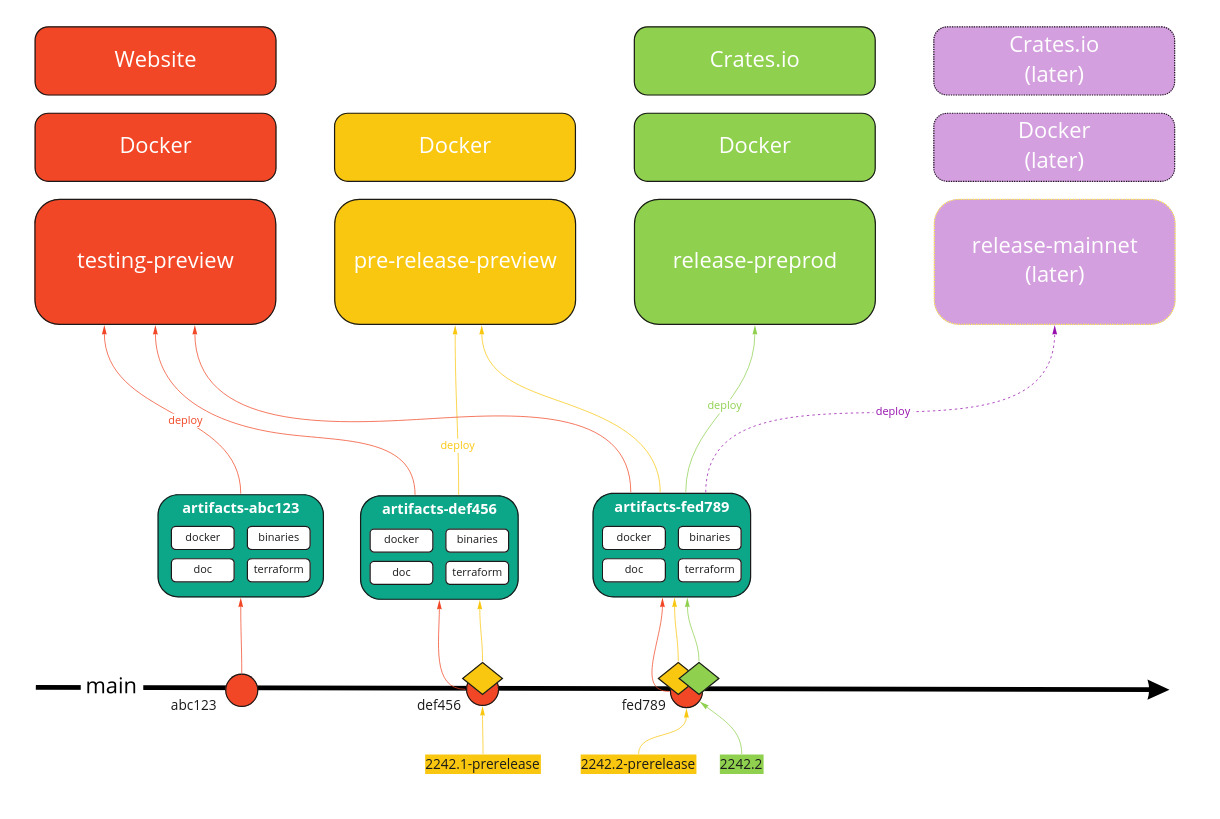Mithril Release Process
· 4 min read
Mithril follows a defined release process
As the Mithril project grew and more and more SPOs became involved in testing Mithril, it became obvious we need clearer identification of artifacts running on various parts of the network. Moreover, on our road towards mainnet availability we'll need to strengthen our testing process in order to validate Mithril network on more realistic environments.
Release Process
We want our release process to follow some basic principles:
- Continuous Integration: New code is integrated into the
maincodeline frequently which triggers automated build and test process. - Continuous Deployment: New artifacts produced by the build process are continuously deployed to a suitable environment where it can be used and tested by an increasing number of parties.
- Deployment Pipeline: The deployment process is embodied in a pipeline that describes and implements all the necessary steps to release a new version of Mithril.
- Artifact Promotion: An artifact is built once and only once and is promoted while travelling through the build pipeline.
Here is a high-level picture of this process:
- We will use a custom version based on SemVer for all the crates, binaries and containers of the repository and for the GitHub release.
- We release a new distribution every 2 weeks (this duration is subject to changes as the project matures)
- The released version is named after the year and its week number: YYWW.patch (e.g.
2250.0). - In case of critical regressions happening in production, a patch version will be released in between "official" releases as a hotfix.
- The released version is named after the year and its week number: YYWW.patch (e.g.
- A new version
YYWW.0will have the following life cycle:- A commit
abc123merged onmainbranch is deployed on the network namedtesting-preview. - A commit
def456tagged withYYWW.0-prereleaseis deployed on the network namedpre-release-preview. - A GitHub release
YYWW.0-prereleaseis created and linked with theYYWW.0-prereleasetag and marked aspre-release. - A tag
YYWW.0-prereleaseis qualified and selected for release or rejected (and replaced by aYYWW.1-prereleasetag if necessary on afed789). - If the tag
YYWW.0-prereleaseis selected, a new tag is created and nameYYWW.0on the same commitdef456. - A GitHub release
YYWW.0is created and linked to theYYWW.0tag and marked asrelease. - The commit
def456with tagYYWW.0is deployed to the network namedrelease-preprod.
- A commit
- The
Cargo.tomlversions of the crates are updated (if required) just before creating theYYWW.0-prereleasetag . - The documentation website is also updated at the same time where the
nextversion becomes thecurrentversion, leaving future updates be appended to thenextversion during the upcoming developments. - In order to simplify the life of Mithril users, we have introduced a version of the
Mithril APIused between client/signer and aggregators to check if the nodes are able to communicate together (following semver and considering the versions are compatible only if they share the same minor). - Our main distribution artifact is currently docker (OCI) images. We also provide more packages, eg.
.debpackages or compiled binaries (some of them available on multiple platforms, e.g. Windows or macOS) to simplify users' life. - We also publish some of our crates on the
crates.ioregistry whenever a new version is created (e.g.mithril-stm).
Networks
- We maintain different Mithril networks (eg. servers, VMs, configurations...) to which artifacts are deployed at various stages of the process:
testing-preview: This is an internal environment based on thepreviewcardano testnet where most of the automated tests happen. It is also used to test features as soon as they are merged on themainbranch.pre-release-preview: This is a persistent environment based on thepreviewcardano testnet. SPOs which are active on preview are welcomed to take part in the Mithril signing process and to test newpre-releasedistributions deployed there.release-preprod: Another persistent environment, based on thepreprodcardano testnet, where more SPOs are expected to join and test, updated less frequently (on actualreleasedistributions).- (LATER)
mainnet: Production environment where new releases are deployed once qualifed onrelease-preprod.
Further Reading
- The Mithril developers have redacted an ADR Release process and versioning that also describes more technically this process.

